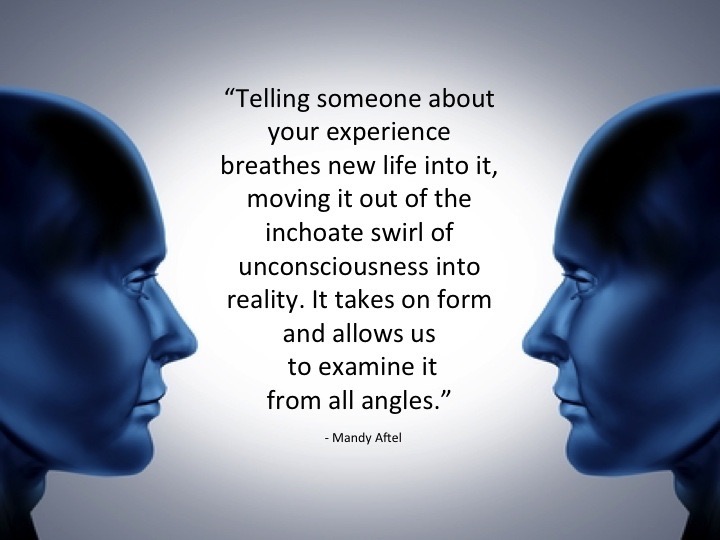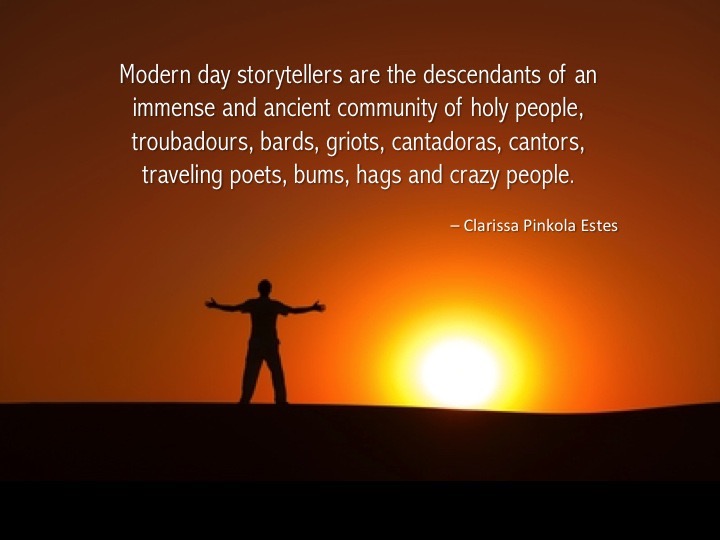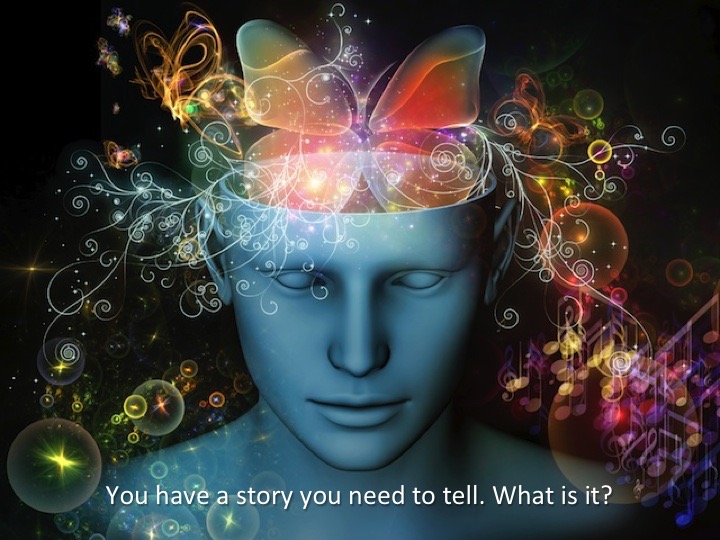Ten Reasons Why People Don't Share Their Stories

I'm sure you've heard the expression, "Suppose they gave a war and nobody came?" -- a question whose roots go back to an old Carl Sandburg poem. The same question holds true for the storytelling revolution. I can flap my mouth about the power of personal storytelling until the cows come home, but unless you and a critical mass of others step up, nothing much will happen. This is a volunteer army I'm talking about, a self-appointed crew of courageous people willing to make their way to the front lines of their own life and tell it like it is -- to share stories that will spark reflection, insight, wisdom, and love in others.
Are there obstacles on this storytelling battlefield? Of course there are. But the biggest ones are invisible -- old thoughts, assumptions, and beliefs that stop us from speaking up. What follows are the ten most common of these obstacles:
1. "MY STORIES ARE NOT INTERESTING ENOUGH"
This is the biggie, the mother of all obstacles -- the belief that you are not heroic or important enough to speak up -- that your stories are mundane, insignificant, and meaningless. Nothing could be further from the truth. You are a human being, the "crown of creation", a member of the species known as homo sapiens -- "the wise ones".

You already have a ton of experiences worth sharing. If you don't think your stories are interesting, it's probably because you haven't probed them deeply enough. In other words, if your story was a box of Crackerjacks, you haven't found the prize yet -- or what William Blake, the 17th century poet, once described as "eternity in a grain of sand."
Bottom line, everything becomes interesting the moment you become interested. You can find meaning anywhere. The stories you tell don't need to be earth-shattering. They don't need to be cosmic. You don't need to be a spokesperson to speak. All you need to be is a human being who wants to elevate the conversation on planet earth. Sometimes, it's the simplest of stories that pack the biggest wallop.
2. "NO ONE WILL CARE ABOUT MY STORIES."
Well, it is certainly possible that no one will care about your stories. And it is certainly possible that no one will listen -- especially these days, when ADD is almost epidemic and listening is in short supply. Your assumption about this, however, most likely comes from your past experiences and if you buy into this belief, it will become a self-fulfilling prophecy.
Maybe, from time to time, you've made attempts to tell your stories and have had little success in getting people to pay attention. Join the club. But just because it's been that way in the past, doesn't mean that's the way it's going to be in the future. Just because your last relationship ended badly, doesn't mean your next one will. Hopefully, you have learned something from your experience -- something that will increase the odds of your next relationship being all you want it to be.
The same thing holds true for storytelling. If you want to increase the odds of people listening to your stories, there are some simple things to pay attention to:
- Make sure you care about your story.
- Practice telling it and get feedback from friends
- Choose a time to tell it when people are most available to listen
- Be animated in the telling. Modulate your voice.
- Before beginning, set some context and get permission to tell it.
3. "I AM NOT A GOOD STORYTELLER"
There's a high probability that you and I have never met -- that I know nothing about you other than the fact that you are reading this. But that's not entirely true. One thing I know about you is that you are a way better storyteller than you think you are. First of all, you are very experienced. You grew up on fairy tales. You watched TV, movies, and read books -- all of which were made of stories. Indeed, 65% of your present day conversations, explain sociologists, are composed of stories. It's the DNA of how human beings communicate. It's the spine of our interactions.
Psychologists refer to this ability of ours as an "unconscious competency" -- the ability to do something without totally being aware that we are doing it. Like breathing... or complaining.. or riding a bike.
The other reason you think you're not a good storyteller is because you have a tendency to compare yourself to other storytellers. Like Garrison Keillor, for example. Or your grandfather. Or your favorite TED speaker.
Cease and desist! It is a waste of time. The storytelling revolution you are being asked to join will not be covered on the nightly news. It will not be turned into a screenplay by Steven Spielberg. The storytelling I'm asking you to do takes place on the front lines of your life -- often with an audience of only one -- maybe your best friend who will love you no matter what. But if you keep telling yourself you're not a good storyteller, you silence yourself. And silence is not what's needed now. What's needed now is millions of people stepping forward to share what really moves them.
We can't wait for Sundays or someone "in a position of power" to shape the narrative. Look where that's gotten us. We need you and all your friends to come out of the closet and let it rip.

4. "I DON'T WANT TO BE THE CENTER OF ATTENTION"
And why might that be? Usually, because you don't like feeling self-conscious or stressed or judged. Or maybe because you think people will think you are "full of yourself", "hogging the show", or otherwise being a prima donna. Fuggedabout it!
While it may seem as if storytellers are the center of attention, the reality is this: the listener is the center of attention. Or, even more accurately, the meaning of the story is the center of attention. The storyteller is merely a catalyst, a facilitator of a moment of insight and understanding in the mind/heart of the listener.
Is an actor, on stage, the center of attention? For a brief moment, yes, but only to capture the attention of the audience so they can feel something and leave the theater with that feeling becoming the center of attention in their own lives. Of course, there are always people who want to be the center of attention for all the wrong reasons: Egomaniacs. Narcissists. People looking for approval. They care less about what people get from the story than being remembered as the person who told the story. But that's not you. You are not about hogging the show. You are not about trolling for love. You are about speaking authentically and sparking moments of insight and understanding in others (and all without proselytizing, evangelizing, or trying to convince anyone of anything).
5. "IT WILL BE TOO STRESSFUL FOR ME"
Public speaking is a bigger fear than the fear of death. Strange, but true. Standing in front of an audience (or even one person) is so anxiety-producing for some people they say they would rather die. Ouch! OK. I get it. You imagine yourself on stage and everyone is looking at you and some of the people looking at you are frowning or bored or checking their email under the table. Of course that would be stressful. But guess what? I'm not asking you to stand on stage and be a public speaker. All I am asking you is do to is share your stories in the informal flow of your own life. One-on-one, with your best friend or your mother, is absolutely fine. No pressure!
The storytelling revolution I'm inviting you to participate in is happening wherever you are. It is not a big deal. There will be no marketing campaign, no slogans, and no dues to pay. And, if all else fails, remember the words of Mark Twain: "If you speak the truth, you never have to remember a thing."
Kapish? To tell your stories, you do not have to memorize anything. You do not need to affect an English accent or look longingly into the distance. All you need to do is tell your story.
Here's as simple as it gets: There's a person (you) with a goal and some obstacles to overcome. Then there's some kind of resolution. That's it. All I'm asking you to do, when the time is right, is to share a meaningful story from your own life -- a surprise moment, an unexpected victory, or a lesson learned.
HINT: Speaking is not stressful. What's stressful is focusing on what people think of you.
6. "I AM A VERY PRIVATE PERSON."
Of course! That's totally fine. Your stories are your own. They are no one's business until you choose to make it their business. Indeed, there are some indigenous tribes living deep in remote forests who believe that if someone takes their photo, they will also take their soul. This is sometimes how we feel when telling a story -- that the person who had heard our story will now have power over us, that we have given away access to a sacred part of us that will now forever be violated by "the other". This is especially true if you are very identified with your story -- an experience, in fact, you consider to be sacred.
Telling one of those stories to a disinterested, arrogant, or judgmental audience will put you in the "pearls before swine" zone. Totally understandable.
That being said, you have two choices: You can choose not to tell stories about parts of your life that are "out of bounds" for the general public. Your second choice? You can see yourself as a catalyst for change -- that, somehow, your life experiences, told in story form, may be of benefit to others, a way to help them gain easier access to parts of themselves they may out of touch with.
That's what Woody Allen does in his movies. He puts his neurosis on the silver screen and "takes one for the team". He gives shape to the collective psyche so the less adventurous people in the audience can get in touch with aspects of their own life that may be hidden or ignored. This, of course, takes courage, insofar as some members of the audience may become so uncomfortable with what they see on the screen that they shoot the messenger. C'est le vie.
If you truly want to be on the front lines of the storytelling revolution, you will need to come out of your privacy closet and let it rip.

7. "I WILL BE JUDGED"
Here's my simple answer: Yes. Sometimes, you will be judged, but so what? First of all, you are already being judged almost all the time by others -- including the people closest to you. It comes with the territory of being human. You could, of course, choose to isolate yourself from others, armed only with your favorite mobile devices and some ice cream, but even then people are going to judge you from a distance. "Your FB posts are too long." "Your texts have too many typos". "You wait too long to respond to my emails".
What you need to remember is this: At the highest level, storytelling is not about you. Not only are you not the center of the universe, you are not even the center of your own story, even when logic dictates that you are. You may be a character in it -- even the hero -- but the real center of the stories you tell is the meaning other people will derive from it -- the learning, the lesson, the insight, or wisdom they will be able apply to their own lives.
8. "I HAVE TRUST ISSUES"
See #7. Having "trust issues" is simply another way of saying that you think people are going to judge you. You've been hurt before by others. Or ignored. Or misunderstood, blamed, abused, dissed, diminished, ridiculed, mocked, or disempowered. Yup. Welcome to the human race. If you let trust issues have their way, forget about becoming part of the storytelling revolution. You'll be holed up in your house filing your papers or waiting for your next lifetime.
Remember... my asking you to join the storytelling revolution is not the same thing as asking you to go on CNN and hold forth as the spokesperson for the storytelling revolution. All it means is that you are willing to share your stories with at least one other person at a time and place of your choosing.
9. "PEOPLE WILL CHANGE MY STORIES WHEN THEY SHARE THEM WITH OTHERS"
Certainly possible, but so what? Songwriters, whose songs are "covered" by other singers, always run the risk of their songs being stylized until they're barely recognizable. What began as their song will be interpreted in countless ways by others. It will morph. It will change. A folk song may become a blues song. A blues song may become a rock song. This is not a bad thing. It may, in fact, increase the shelf life of the song. So let people change your stories. Remember this is really not about you anyway. You are just the messenger. This is about the meaning people will make of your story and how they will apply the essence of your story to their own lives. Your storytelling is just getting the party started.

10. "MY STORY ISN'T READY"
Ah.. welcome to the fabulous world of storytelling Zen koans. The thought that your story isn't ready to share can be both true and untrue at the same time. Indeed, it is the tension between these two polarities that most commonly leads to inaction. On one hand, it is absolutely true that your story may not be ready for prime time. You may be in the process of incubating on it, refining it, hatching the "story egg", so to speak. If you tell your story too early, you may be trotting out a half-baked message that will fall with a thud. Yup. It's the same thing with new ideas. Sometimes you might have an awesome idea, but if you communicate it too soon, you might subvert its potential of it actually landing.
But there is another side of the storytelling coin for you to consider. Sometimes, the assumption that "my story isn't ready to share" is simply a function of perfectionism -- the same reason why you don't try anything new. You tell yourself you don't have enough information, or enough degrees, or haven't done enough research yet. Please be mindful of this tendency.
Sometimes, the only way your story will be ready to share is to tell it. Or what Tom Peters meant when he said, "Ready, fire, aim!"
This is the same reason why many Broadway plays start off in Peoria. "The path is made by walking on it," goes the old adage. Start walking.
The Wisdom Circles of San Miguel
The facilitator of Wisdom Circles
Storytelling for the Revolution
Posted by Mitch Ditkoff at January 25, 2019 10:19 AM
Comments
After having read this article I am now ready to share my story and let the chips fall where they may.
Posted by: rolan ![[TypeKey Profile Page]](http://www.ideachampions.com/storytelling/nav-commenters.gif) at July 5, 2019 10:29 AM
at July 5, 2019 10:29 AM
Post a comment
Thanks for signing in, . Now you can comment. (sign out)
(If you haven't left a comment here before, you may need to be approved by the site owner before your comment will appear. Until then, it won't appear on the entry. Thanks for waiting.)







 If you like this blog, you might also like Mitch's other two blogs:
If you like this blog, you might also like Mitch's other two blogs: 